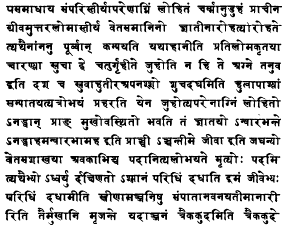No CrossRef data available.
Article contents
Art. VI.—Remarks by Raja Radhakanta Deva, on Art. XI, Journal Royal Asiatic Society, Vol. XVI, p. 201;
Published online by Cambridge University Press: 14 March 2011
Extract
The sixteenth volume of the Journal of our Society, has given insertion to a communication made by me, on the supposed authority of the Vedas, for the burning of Hindu widows, in which I have shown that the passage quoted as enjoining the practice, and as published by Mr. Colebrooke, in his Paper in the Asiatic Researches, upon the “Duties of a Sati or Faithful Widow,” had been either purposely or accidentally wrongly read, and that so far from authorizing the rite, its real purport was the reverse; and that it expected the widow to repress her affliction and return to her worldly duties. This view was entirely confirmed by the explanation of the passage given by the celebrated commentator, Sayana Acharya, and by the precepts of Aswalayana, cited by Professor Maximilian Miiller, published in continuation of my remarks on the same occasion. The revised reading has not proved acceptable to the Pandits of Calcutta, and the following letter is the expression of their sentiments. The writer, a friend of many years, Raja Radhakant Deb is well known as a leading member of the Native Society of Calcutta, who adds to the distinction of rank and station, that of a foremost place amongst Sanskrit scholars, as evinced by his great Lexicon or Literary Encyclopaedia of the Sanskrit language, in seven quarto volumes; the Sabdakalpadruma, which enjoys a European as well as Indian celebrity. Any opinion coming from him on subjects connected with the ancient literature of hia country is entitled to the greatest deference. The question of the authority for the Sati cremation is now, as he rightly observes, a matter merely for literary discussion, but as it is not without interest for the historian and antiquarian, his remarks will, I doubt not, be highly acceptable to those scholars who are engaged in the investigation of the ancient religion and history of the Hindus; and as he has no objection to their being laid before the public, I have thought it advisable to request a place for them in the Journal, although, as I shall subsequently explain, they have not induced me to modify in the least my opinions on the subject, as my esteemed correspondent seems t o anticipate.
- Type
- Original Communications
- Information
- Copyright
- Copyright © The Royal Asiatic Society 1860
References
page 210 note 1 Text.![]()
![]() Com.
Com. ![]()

Text, ![]()
![]()
![]() Com.
Com. ![]()

page 211 note 1 Vowed or voluntary observances
page 211 note 2 Lord of Vratas
page 211 note 3 Source of the Vedas
page 211 note 4 The first part of the address beginning with “ Udirshwa,” &c, is the same in respect of the funeral of the first three classes: by this Mantra the widow is requested to leave the corpse and to return to her abode. The remaining three Mantras are to be addressed to the widow of a Brahmana, Kshetriya, and Vaisya respectively, whereby she is required to lift up from the funeral pile the respective symbols of the deceased, and therewith to rub his hands. This call forms an important part of the ceremony.
page 212 note 1 ![]() :
: ![]() Bharadwajás Sútra, Prasna 1.
Bharadwajás Sútra, Prasna 1.
![]()
![]() Aswalayana's Grihya Sútra, Adhyádya iv. 3.
Aswalayana's Grihya Sútra, Adhyádya iv. 3.
![]() Com.
Com. ![]()
![]()
![]() Ib. Adh.ii. 3.
Ib. Adh.ii. 3.

Bharadwája's Sutra.
![]()
![]() Aswa, ii. 2.
Aswa, ii. 2.

Sahamaranavedhi.
page 212 note * Her (the widow) lying on the north of the deceased, if she want courage, her husband's brother, or fellow-student, or old servant shall, by reciting the two Mantras Udirshwa, &c, raise, holding her by the hand and saluting her; but if she have sufficient courage, she bidding adieu to her friends, relatives, and children, and contemplating the Vishnu-like form of her husband, enters the fire.
page 213 note 1 ![]()

page 213 note 2 ![]()
![]()
page 213 note 3 ![]()
page 213 note 4 ![]()
page 213 note * “The loyal wife (who burns herself) shall not be deemed a suicide.”
page 214 note 1 ![]()

![]()
![]() Bharadwája's Sutra, Prasna 1, Khanda II.
Bharadwája's Sutra, Prasna 1, Khanda II.

![]() Aswaláyana's Grihya Sútra, Adhyaya III.
Aswaláyana's Grihya Sútra, Adhyaya III.
page 216 note 1 ![]()
Gotama quoted by Kullukabhatta in his Com. on Manu, v. 14, B. 2, which see
page 216 note 2 Sáiyana, when he says, in his Commentary on the 8th Rich;“Yasmát anusarana nischayam ákárshih tasmádágachchha,” he takes the same view; he does not consider the burning as delayed, as may be supposed from a technical interpretation of the word “anusarana,” because, as you say, subsequent burning is inconsistent with the presence of the corpse.
page 216 note 3 ![]()
![]()


